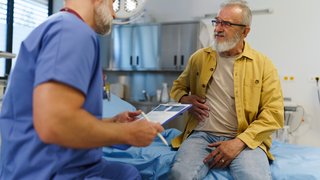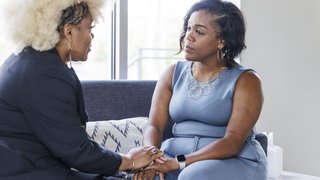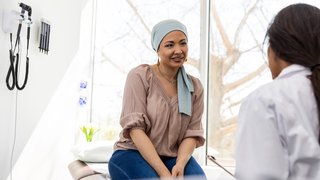
Cancer has been on Denise’s mind for decades. She lost her paternal grandmother and aunt to ovarian cancer and three other aunts, also on her father’s side, to breast cancer. All five women were diagnosed at young ages, some in their 30s. Their children were left not only to deal with the loss of their parent but with the constant concern that a cancer gene was running through the family tree. According to Denise, their family’s history of cancer haunted them. But as it turned out, knowing her family’s history saved Denise’s life.
Denise, a registered nurse at UT Southwestern’s William P. Clements Jr. University Hospital in Dallas, moved to Texas from Connecticut with her husband and three children a couple years ago. Once settled in, she went about finding new doctors and setting up appointments.
Because of her family history, she was monitored closely with regular mammograms to detect early breast cancer, as well as with transvaginal ultrasounds and CA-125 tests to detect ovarian cancer; all the screening tests were normal and assured her she was free of cancer. When Denise visited our cancer genetics clinic, she reported that a cousin was recently found to have a BRCA mutation. When we informed Denise that she had a 25 percent chance of having that same mutation, she chose to have the genetic test. If she didn’t carry the family’s mutation, she could discontinue intensive screening for breast and ovarian cancer. If she did carry the mutation, there would be more for her to do to protect herself from future cancers.
Testing positive for a genetic mutation
Denise tested positive for a BRCA1 mutation. BRCA1 mutations are well known for putting patients at high risk for breast cancer, but they also impose an increased risk for ovarian, prostate, pancreatic, and other cancers.
Because Denise had finished having children, she was advised to have her fallopian tubes and ovaries removed (a surgery called a prophylactic salpingo-oophorectomy). The idea was that by having this prophylactic surgery she could prevent future cancers.
At UT Southwestern Harold C. Simmons Comprehensive Cancer Center, our surgeons and pathologists follow a detailed protocol when patients with a genetic mutation have prophylactic surgery, and the protocol includes tests for microscopic cancer.
For Denise, this surgery proved lifesaving. Instead of being preventive, it was therapeutic. The pathologist found a small 1-millimeter-wide tumor and a second even smaller tumor, both in her right fallopian tube – among the smallest cancers ever detected at UT Southwestern. The “larger” tumor was as wide as the thickness of a penny. Because the cancer was detected at an early stage, her chances of survival are more than 90 percent.
Denise’s oncologist recommended chemotherapy. Denise has since completed 18 weeks of chemotherapy and has checkups with her oncologist every three months. To help others, she shares her story and writes a blog about her experiences.
Without the surgery, Denise would most likely have developed the nonspecific ovarian cancer symptoms such as bloating, fatigue, and frequent urination. But these symptoms appear only after ovarian cancer progresses to a late stage – a stage where her survival would have been around 40 percent.
Ovarian cancer is notorious for evading the prevailing screening tests. The CA-125 levels and transvaginal ultrasound screenings Denise had been receiving had provided a false sense of security. Researchers are working to improve screening tests for ovarian cancer, but meanwhile the lack of a better screening test is one reason we advise patients to have surgery. Today, Denise gratefully says, “Without the surgery, I probably wouldn’t have lived to see 55.”
Ovarian cancer’s link to heredity
As many as a quarter of ovarian cancer cases have a known hereditary cause. In addition to BRCA1 and BRCA2, there are other inherited mutant genes associated with ovarian cancer risk. Continued research will identify more and more of these. And breast and ovarian cancer genes are just as likely to be inherited from your father as they are from your mother (e.g., Denise inherited her BRCA1 mutation from her dad). It’s important to learn as much as you can about your family history and share it with your doctor and your family.
Denise has reasonable hopes that the microscopic discovery from her surgery will play out in a big way: “I hope to attend my children’s weddings – and meet my grandchildren,” she says. “My aunts never had that opportunity.”
When her children are adults, they will have the opportunity to choose to be tested and know their risks. They each have a 50 percent chance they inherited the family’s BRCA1 mutation. If they did, they’ll be able to use this genetic knowledge to prevent cancers in ways their ancestors didn’t have.
For more information about ovarian cancer treatment options or our cancer genetics program in Dallas, request an appointment online or call 214-645-8300.










